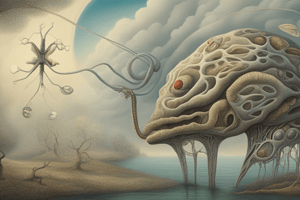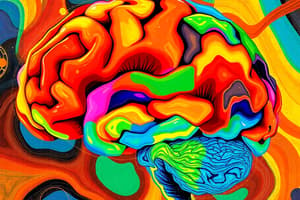Podcast
Questions and Answers
Which brain region is primarily involved in encoding a map of the world?
Which brain region is primarily involved in encoding a map of the world?
- Amygdala
- Prefrontal Cortex
- Hippocampus (correct)
- Cerebellum
Spatial memory is only used for navigating large distances.
Spatial memory is only used for navigating large distances.
False (B)
What is the first brain region that tends to be damaged in Alzheimer's disease?
What is the first brain region that tends to be damaged in Alzheimer's disease?
hippocampus
The ability to get from one place to another is referred to as ______.
The ability to get from one place to another is referred to as ______.
Match the following concepts with their descriptions:
Match the following concepts with their descriptions:
Which of the following is an example of using spatial memory for a small-scale task?
Which of the following is an example of using spatial memory for a small-scale task?
The size of the hippocampus remains constant throughout adulthood.
The size of the hippocampus remains constant throughout adulthood.
What type of memory involves remembering events that occur in one's life?
What type of memory involves remembering events that occur in one's life?
Deficits in the ability to navigate are often seen in people with impaired ______ ability.
Deficits in the ability to navigate are often seen in people with impaired ______ ability.
Match the following statements with the concept that they illustrate:
Match the following statements with the concept that they illustrate:
Which of the following lifestyle factors can influence the progression of Alzheimer's disease?
Which of the following lifestyle factors can influence the progression of Alzheimer's disease?
Navigation and episodic memory function independently of each other.
Navigation and episodic memory function independently of each other.
What cells are affected in the hippocampus that contribute to the eventual death of hippocampal cells?
What cells are affected in the hippocampus that contribute to the eventual death of hippocampal cells?
One way to predict Alzheimer's disease is by tracking a patient's ______ in episodic memory.
One way to predict Alzheimer's disease is by tracking a patient's ______ in episodic memory.
Match the following terms with their descriptions:
Match the following terms with their descriptions:
What theoretical idea is used to reconcile the involvement of the same brain region in separate types of memory?
What theoretical idea is used to reconcile the involvement of the same brain region in separate types of memory?
Associative learning plays no role in how we learn to navigate.
Associative learning plays no role in how we learn to navigate.
What term is used to describe coding that is world-centered?
What term is used to describe coding that is world-centered?
Spatial behaviours can relate to ______ scale things as well.
Spatial behaviours can relate to ______ scale things as well.
Match terms with the definitions:
Match terms with the definitions:
In the context of spatial encoding, what does an egocentric spatial term depend on?
In the context of spatial encoding, what does an egocentric spatial term depend on?
If you are following a well-known route based on landmarks and that route is blocked, you can easily find a detour using only landmark knowledge.
If you are following a well-known route based on landmarks and that route is blocked, you can easily find a detour using only landmark knowledge.
What type of memory would involve the need for you to consult a map?
What type of memory would involve the need for you to consult a map?
Hippocampal cells are hardwired to create ______ for us as we’re moving in learning spaces.
Hippocampal cells are hardwired to create ______ for us as we’re moving in learning spaces.
What actions do landmark action associations rely on?
What actions do landmark action associations rely on?
Why does navigating familiar places feel automatic?
Why does navigating familiar places feel automatic?
Navigation learning can be helped through a theoretical study of psychological behaviors.
Navigation learning can be helped through a theoretical study of psychological behaviors.
What is the definition of what navigation is?
What is the definition of what navigation is?
The first aid/help we discovered is as part of the brains G.P.S., the ______ GPS system in the early 70s.
The first aid/help we discovered is as part of the brains G.P.S., the ______ GPS system in the early 70s.
Match the following concepts to the researchers who discovered them:
Match the following concepts to the researchers who discovered them:
Flashcards
Hippocampus
Hippocampus
Brain region that encodes maps of the world and is heavily involved in episodic memory.
Dedicated Neurons
Dedicated Neurons
Brain cells that produce representation of space for navigation.
Navigation Definition
Navigation Definition
The ability to move and know how to get from one place to another, large or small distances.
Hippocampus & Alzheimer's
Hippocampus & Alzheimer's
Signup and view all the flashcards
Episodic Memory
Episodic Memory
Signup and view all the flashcards
Small-Scale Spatial Memory
Small-Scale Spatial Memory
Signup and view all the flashcards
Hippocampal Shrinkage
Hippocampal Shrinkage
Signup and view all the flashcards
Predicting Alzheimer's
Predicting Alzheimer's
Signup and view all the flashcards
Hippocampal Cell Death
Hippocampal Cell Death
Signup and view all the flashcards
Cognitive Theory Application
Cognitive Theory Application
Signup and view all the flashcards
Spatial Encoding Methods
Spatial Encoding Methods
Signup and view all the flashcards
Spatial Memory in Daily Life
Spatial Memory in Daily Life
Signup and view all the flashcards
Efficient Navigation
Efficient Navigation
Signup and view all the flashcards
Two Ways of Navigation
Two Ways of Navigation
Signup and view all the flashcards
Landmark Associations
Landmark Associations
Signup and view all the flashcards
Having Spatial Understanding
Having Spatial Understanding
Signup and view all the flashcards
Egocentric Spatial Terms
Egocentric Spatial Terms
Signup and view all the flashcards
Egocentric Encoding
Egocentric Encoding
Signup and view all the flashcards
Alice Centric
Alice Centric
Signup and view all the flashcards
Blocked Route
Blocked Route
Signup and view all the flashcards
Hardwired Hippocampal Maps
Hardwired Hippocampal Maps
Signup and view all the flashcards
Place Cells
Place Cells
Signup and view all the flashcards
Place Cell Significance
Place Cell Significance
Signup and view all the flashcards
Patient H.M.
Patient H.M.
Signup and view all the flashcards
H.M.'s Memory Retention
H.M.'s Memory Retention
Signup and view all the flashcards
Cat Study
Cat Study
Signup and view all the flashcards
Neuronal Activity
Neuronal Activity
Signup and view all the flashcards
Seed Scatter Experiment
Seed Scatter Experiment
Signup and view all the flashcards
Cell Firing Significance
Cell Firing Significance
Signup and view all the flashcards
Place Coding
Place Coding
Signup and view all the flashcards
Study Notes
Hippocampal GPS and the Brain
- The focus is on the brain, specifically the hippocampus, and how it encodes a map of the world..
- Neurons are dedicated to producing spatial representation.
- The hippocampus deals with space and creates a "map saurus".
- The hippocampus is involved in episodic memory, which stores memories of life events.
- Brain mapping and remembering events happen on a daily basis.
Navigation and the Hippocampus
- The first brain region damaged in Alzheimer's disease is the hippocampus.
- Damage to the hippocampus leads to deficits in navigation and memory recall.
- Navigation is defined broadly as the ability to move from one place to another.
- Spatial behaviors relate to both large distances like commuting and small-scale actions like navigating a kitchen.
- Spatial memory is needed for everyday tasks like making tea or coffee.
Episodic Memory and the Hippocampus
- Episodic memory stores memories for events in our lives
- Episodic memory is fundamental to human existence so we can tell each other stories of the past.
- Memory of events determines where we want to return to or otherwise.
- The hippocampus shrinks as one ages as part of healthy ageing.
- The hippocampus shrinks to a greater extent in those with diseases like Alzheimer's
- Navigation and episodic memory rely on the hippocampus.
- In Alzheimer's disease, hippocampal cells begin to die, which can be tracked via navigation and episodic memory tests.
- While there is no cure for diseases like Alzheimer's, lifestyle factors can slow it down:
- Exercise
- Diet
- Smoking
- Heavy Drinking
- Lifestyle factors contribute to the death of hippocampal cells.
Interventions and Research
- Lifestyle interventions can slow down disease progression
- Core cognitive research is trying to predict Alzheimer's disease via navigation and episodic memory
- Gold standard tests which determine episodic memory exists
- Navigational declines can be detected earlier in mild cognitive impairment stages.
- Hippocampal cells involved in navigation will be examined to see how they create episodic memories
Theoretical Understanding of Hippocampus and Disease
- The same brain region is involved in two separate types of memory.
- The biology of diseases will be looked at.
- Processes causing cell death in the hippocampus and theoretical applications for disease markers will be investigated.
- Theoretical concepts are being used to detect diseases
Hippocampal Encoding and Spatial Awareness
- The hippocampus encodes the spaces we walk through.
- Alice-centric and egocentric spatial encoding.
- Learning outcomes include mapping how people navigate based on theoretical concepts with associative learning versus the traditional idea of maps
Learning and Navigation Techniques
- Single-cell recording can uncover what we know about a place.
- Spatial memory and navigation are used daily from making a cup of tea to commuting from home.
- People avoid eating, sleeping, working, and socializing in the same place
- You have to go to another room to socialize.
- Navigation is a key part of day to day life.
- Locations within the world are learned.
- Navigation becomes efficient when you learn where locations are.
- There are two broad ways to get from the start to the destination.
- A familiar place is used as an example
- If the path is well rehearsed, sites are associated with turning in a particular direction.
- Landmark action associations involve chaining enough of those associations
- The undergraduate concept is chaining associative links where the brain learns to associate getting food by pressing a lever.
Spatial Understanding and Cognitive Maps
- Spatial learning happens with buildings instead of levers
- Spatial learning is fundamental to mammals
- Spatial relationships are linked to the concepts of learning, sex to learning
- You associate sites to turning directions
- If associations are chained, you end up at the destination
- Streets can be blocked, and consulting a map can assist in finding a detour
- Navigation around the world helps to understand spatial relationships
- Maps can help find landmarks and see if streets are blocked
Egocentric vs Allocentric
- Schematics can get you from A to B by visualizing landmarks, associative learning and stimulus
- Habitual turns are made up of stimulus and response
- Egocentric spatial terms are where positions in the world depend on where you are at the moment
- Egocentric examples include how the screens are behind someone currently depending on where they are located
- Egocentric is entirely based on where you are and what you're looking at.
- Allocentric representations are object-to-object encoding.
- World centered coding describes where something is based on what you can see in the world
- A screen is always north.
- Egocentric includes where you have to move depending on facing directions.
Cognitive Maps and Spatial Learning
- Encoding and navigation are based on whether you encode things based on where you are, where you can see, following a compass.
- Navigation behaviours are driven by both concepts
- Following well known routes you can get stuck if it's blocked.
- Most mammals create cognitive maps to determine the best path to go down when you see an obstacle.
- Cognitive maps determine flexible navigational processes.
- Cognitive maps create an idea of spatial layout.
- Detours or short cuts can be made with cognitive maps
- You don't need google maps, and you can just automatically do it with a cognitive map
Hippocampal Cell
- Hippocampal cells are hardwired to create maps as we move through learning spaces.
- Places will start to feel familiar in the brain creating familiar maps
- Nobel Prize was awarded for discovering hippocampal cells.
- Realisation that hippocampal cells represent the abstract concept of place, rather than a concrete object or visual stimulus, had important implications.
- Space's representation is of profound interest to many academics
- Finding the system in the brain that represents space is very important.
- The hippocampal GPS system found in the early 70's.
- Hippocampal GPS system was found accidentally
Hippocampus and patient HM
- Knowledge of the hippocampus in terms of cognitive abilities based on patient H.M.
- Patient H.M had severe epilepsy and had medial temporal lobes removed in a surgical procedure as a cure.
- Side effects included memory loss such as anterograde and retrograde amnesia
- Day to day experience were forgotten, where he also had trouble recalling past events.
- Brain regions dealing with episodic memory were removed with event memory.
- Sue Cooke studies multiple case studies on patients similar to H.M.
- H.M could not recall memories of personal events.
- HM didn't remember specific details of what he was doing.
- Recollection of episodes was possible, and early scientific thought was that this was due to psychology.
- The hippocampus involves memory events.
Neural Recording
- Miss Whittingham was related to memory and wanted to record single neurons in a hippocampus
- A specific technique was wanted to record a single neuron as a moving animal.
- In the early 60s others can record single neurons too in cats.
- Single neurons right in the occipital lobe.
- Researchers interested in what the cat can see and what they're coding for in terms of what the cat could see
- Cat would initialising by pinning the cats eye lid for them to see stimulus.
- Electrode inserted into the cats brain.
- Animals must be fixed in position anethetised.
- Process involved recording from a single neuron as an animal moves around its environment
- Recording would allow you to do what we say spiked or fires
Neural Activity
- This gives better idea on what neurons were doing freely
- Animals are behaving more normal
- Micro electrode looks like a syringe.
- Inserting an electrode on an animal's skull,
- Electrical activity that occurs allows an action potential to occur
- Neuroses generate activity during an action potential.
- Recording is possible while animals are moving
- Geiger counter noises indicates a neurone firing where we're recording from seven different cells
- Movement determines whether neuron firing.
- Neurone firing can be fine tuned. FMRI can allow people to walk around
- Study the hippocampus as as whole with fMRI.
- Recording from single neurons can reduce to a neural level
- Neurones can be active in the hippocampus.
- Accidental discovery by Keith came from work in the thalamus.
- Inserting inadvertently into hippocampus instead of the thalamus laterally.
- Sacrificing the brain shows where electrode was inserted.
- The researcher was in the thalamus when he was really recording from the hippocampus
- The cell recording has properties of movement
The HippoCampus as a Spatial Map
- Recording may link events in life and memory
- Responds to animal movements in space
- The structure of a rat and human hippocampus is similar
- Theyre evolutionary ancient parts of the rain
- Mice, rats, monkeys and humans all have similar hippocampus
- The neurone hippocampus responds to the animals movement'
- The function is to identify what the hippocampus can do by memory.
- Studies consist of MSC Project research
- Animals move via a seed experiment
- Researcher scatters seed that animals would "hoover up".
- Animal movement includes chamber chambers
- Animals can be shown to press levers with lights coming on.
- Enclosures track where animal moves
Coding and Place Cells
- Electrodes record data while an animal moves from the middle to outlines meeting the animals.
- An enclosure assists married square chamber animal
- Heatmaps interpret cell activity
- If a cell is not firing, it will have a dark blue match
- Cell activity relates to the animal’s location within an enclosure.
- Neurone turns red when visiting the area.
- Cells are often silent.
- They care about where the animal is only when coming to a region of space.
- Neurones coded that corner of the box.
- Cells can code when an animal comes up to the opposite side
- Cells can start to map places.
- "Place" is an appropriate name
- Encodes a specific place.
- These cells are place cells.
- There are thousands in the HPC
- You can track what's happening in a location via the cells the respond
- Animal has to be in a corner if the cell is firing.
- Location relates to firing.
- These place cells can start to code a location where animals are within an environment
Studying That Suits You
Use AI to generate personalized quizzes and flashcards to suit your learning preferences.




